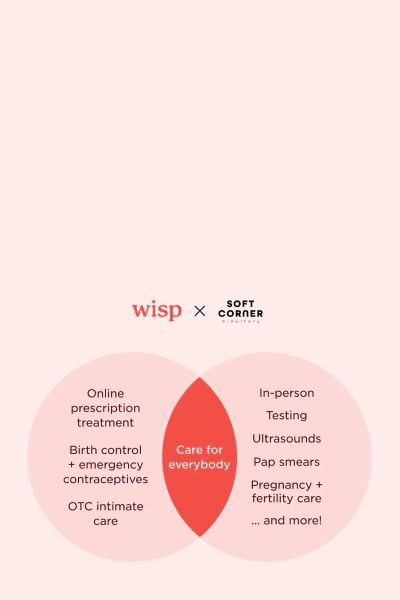
Wisp x Soft Corner Midwifery
By Kathleen Morrison
February 14, 2022
Wisp is partnering with Soft Corner Midwifery! Founded in 2020 and based in Bath, Maine, Soft Corner offers personalized comprehensive and holistic reproductive care. They believe in empowering patients while fostering intuition and self-advocacy and use a current evidence-based approach, to keep you informed and confident throughout your decision-making process.
Although formal midwife training programs were established in the 17th century (and midwives existed long before that!), seeking care from a midwife is still sometimes considered a “radical” path for people who are pregnant or trying to conceive in the United States. While using a midwife is very common in other countries, the US leans towards a different model of care. However, the research shows integrating midwives into the mainstream medical system improves outcomes for pregnant people and their newborns. And let’s be honest, pregnancy and reproductive care here has some room for improvement—so let’s talk about it!
What is a midwife?
Midwives are trained professionals who help support people in their reproductive needs, including abortion, conception, birth, postpartum recovery, and more. You may think of midwives as women who appear in the background of period dramas to assist in births, but in reality, they are still very much present today and do much more than deliver babies (although they do that too!). Soft Corner Midwifery is a collective of reproductive care professionals that includes licensed midwives, assistant midwives, nutritionists, pelvic floor specialists, lactation consultants, and postpartum doulas. They have an expert for every stage of your reproductive journey (even for those interested in preventing pregnancy!).
How is a midwife different than an OB-GYN?
The main difference between an OB-GYN and a midwife is that OB-GYN’s are trained to treat and manage pathologies, illnesses, and complications in pregnancy and reproductive care, and midwives specialize in preventing pathologies or illnesses in pregnancy and reproductive care. Generally speaking most people (more than 90% depending on the study that you look at) are considered low-risk and healthy throughout their pregnancies. When a person’s reproductive care is complicated by an illness, midwives collaborate with OB-GYNs in care. There’s quite a difference in care models and people seek out the services of midwives for a variety of reasons.
- They want to be more involved in decisions around their pregnancy. Hospitals and OB-GYN offices are often very busy and follow strict protocols for expectant parents. Midwives typically aim to collaborate with their patients and empower them to create an individualized care plan.
- They want to take a holistic approach to reproductive care. Traditional medical care tends to be fractured—you have a specialist for different areas of the body and you see an OB-GYN specifically for pregnancy. Midwives take a more holistic approach that may include spiritual and emotional care, as well as any unique individual needs that may arise.
- They don’t trust, or have had negative experiences with, the traditional medical care system. It’s no secret that the US healthcare system can be overwhelming, expensive, and reflective of the same prejudices as American society. Patients who are part of marginalized communities may have experienced discrimination within the medical system themselves, or have a distrust of a system that has discriminated against their communities in the past.
Remember: one option for care is not better than another—what’s important is that you feel your needs are met as a patient. Some patients see an OB-GYN and a midwife to experience the benefits of both.
Is a midwife the same as a doula?
To explain it simply, a midwife focuses more on physical and reproductive health and wellness. They are medically trained and qualified to deliver babies and manage complications that may require collaboration with OB-GYNs. Midwives are your primary care provider and offer clinical services and assessments like drawing your blood, ultrasounds, IV fluids, administering medications, and more.
A doula focuses on offering emotional and informational support for patients, specifically around childbirth, and does not have any clinical or medical training. A doula often acts as an advocate for the pregnant person’s own needs, and helps them create a birth plan which enables them to have a memorable and empowering experience while giving birth. They are often in the room during birth to offer relaxation and breathing technique support, massage, and assistance with labor positions. While midwife and doula duties overlap, as midwives also offer tons of emotional and informational support to their clients, the big difference is that midwives are considered primary care providers for birthing people. That being said, many people choose to expand their birth team and have both!
How are Soft Corner and Wisp working together?
The laws around what exactly midwives can and can’t do vary widely state by state. Even though Soft Corner providers have a comprehensive formulary of medications they can administer, can perform lab tests and bloodwork, and can do fancy things like providing IV fluids, current legislation doesn’t allow them to actually prescribe medicine to their clients. As you can imagine, this leaves a gap in care for patients who are found to have simple infections like UTIs, yeast infections, and BV, or are looking for birth control options, like the pill. That’s where Wisp comes in! We provide simple and easy prescriptions for the clients in Soft Corner’s care. Soft Corner’s town of Bath, Maine is rural (pop. 8,319) and some of their clients drive from up to 2 hours away to see their midwives! As you can imagine, it can be difficult to get to a doctor for a straightforward prescription, but Wisp is making it easier.
Want to learn more about our journey with Soft Corner? Follow both of us on IG @hellowisp and @softcornermidwifery for updates and more midwife education!

